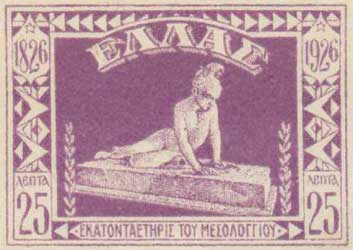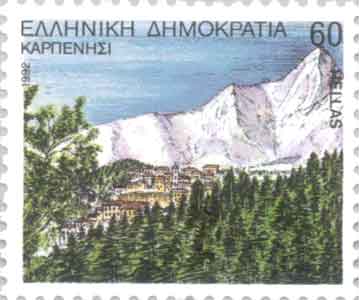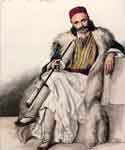|
|
Markos Botsaris (c. 1788 - 21 August 1823) was a Greek leader in the War of Greek Independence.
Born at Suli in Epirus, a region of northwestern Greece, he was the second son of Kitsos Botsaris, murdered at Arta in 1809 by order of Ali of Ioannina. In 1803, after the capture of Suli by Ali Pasha, Markos, with the remnant of the Suliots, crossed over to the Ionian Islands, where he ultimately took service in a Suliot regiment in French pay.
In 1814 he joined the Greek patriotic society known as the Filiki Eteria, and in 1820, with other Suliots, made common cause with Ali of Ioannina against the Ottomans. On the outbreak of the Greek revolt, he distinguished himself by his courage, tenacity and skill as a partisan leader in the fighting in western Hellas, and was conspicuous in the defence of Missolonghi during the first siege (1822-1823). On the night of the 2lst of August 1823 he led the celebrated attack at Karpenisi of 350 Suliots on 4000 Albanians who formed the vanguard of the army with which Mustai Pasha was advancing to reinforce the besiegers. The rout of the Turks was complete; but Botsaris himself fell.

The Bullet which killed Markos Botsaris
Ludovico Lipparini (1800-1856) La morte di Marco Botzaris Civico Museo Sartorio, Trieste, Italia
His memory is still celebrated in popular ballads in Greece. Markos's brother Kostas Botsaris (Constantine), who fought at Karpenisi and completed the victory, lived to become a general and senator in the Greek kingdom. He died at Athens on the 13th of November 1853. Markos's son, Dimitrios Botsaris, born in 1813, was three times minister of war under the kings Otto and George. He died at Athens on the 17th of August 1870.

Markos Botsaris, Jean-Léon Gérôme , 1874
"Marco Bozzaris," by Fitz-Greene Halleck (1790-1867),
At midnight, in his guarded tent,
The Turk was dreaming of the hour
When Greece, her knee in suppliance bent,
Should tremble at his power:
In dreams, through camp and court, he bore
The trophies of a conqueror;
In dreams his song of triumph heard;
Then wore his monarch's signet ring:
Then pressed that monarch's throne—a king;
As wild his thoughts, and gay of wing,
As Eden's garden bird.
At midnight, in the forest shades,
Bozzaris ranged his Suliote band,
True as the steel of their tried blades,
Heroes in heart and hand.
There had the Persian's thousands stood,
There had the glad earth drunk their blood
On old Platæa's day;
And now there breathed that haunted air
The sons of sires who conquered there,
With arm to strike and soul to dare,
As quick, as far as they.
An hour passed on—the Turk awoke;
That bright dream was his last;
He woke—to hear his sentries shriek,
"To arms! they come! the Greek! the Greek!"
He woke—to die midst flame, and smoke,
And shout, and groan, and sabre-stroke,
And death-shots falling thick and fast
As lightnings from the mountain-cloud;
And heard, with voice as trumpet loud,
Bozzaris cheer his band:
"Strike—till the last armed foe expires;
Strike—for your altars and your fires;
Strike—for the green graves of your sires;
God—and your native land!"
They fought—like brave men, long and well;
They piled that ground with Moslem slain,
They conquered—but Bozzaris fell,
Bleeding at every vein.
His few surviving comrades saw
His smile when rang their proud hurrah,
And the red field was won;
Then saw in death his eyelids close
Calmly, as to a night's repose,
Like flowers at set of sun.
Come to the bridal-chamber, Death!
Come to the mother's, when she feels,
For the first time, her first-born's breath;
Come when the blessed seals
That close the pestilence are broke,
And crowded cities wail its stroke;
Come in consumption's ghastly form,
The earthquake shock, the ocean storm;
Come when the heart beats high and warm
With banquet-song, and dance, and wine;
And thou art terrible—the tear,
The groan, the knell, the pall, the bier,
And all we know, or dream, or fear
Of agony, are thine.
But to the hero, when his sword
Has won the battle for the free,
Thy voice sounds like a prophet's word;
And in its hollow tones are heard
The thanks of millions yet to be.
Come, when his task of fame is wrought—
Come, with her laurel-leaf, blood-bought—
Come in her crowning hour—and then
Thy sunken eye's unearthly light
To him is welcome as the sight
Of sky and stars to prisoned men;
Thy grasp is welcome as the hand
Of brother in a foreign land;
Thy summons welcome as the cry
That told the Indian isles were nigh
To the world-seeking Genoese,
When the land wind, from woods of palm,
And orange-groves, and fields of balm,
Blew o'er the Haytian seas.
Bozzaris! with the storied brave
Greece nurtured in her glory's time,
Rest thee—there is no prouder grave,
Even in her own proud clime.
She wore no funeral-weeds for thee,
Nor bade the dark hearse wave its plume
Like torn branch from death's leafless tree
In sorrow's pomp and pageantry,
The heartless luxury of the tomb;
But she remembers thee as one
Long loved and for a season gone;
For thee her poet's lyre is wreathed,
Her marble wrought, her music breathed;
For thee she rings the birthday bells;
Of thee her babe's first lisping tells;
For thine her evening prayer is said
At palace-couch and cottage-bed;
Her soldier, closing with the foe,
Gives for thy sake a deadlier blow,
His plighted maiden, when she fears
For him the joy of her young years,
Thinks of thy fate, and checks her tears;
And she, the mother of thy boys,
Though in her eye and faded cheek
Is read the grief she will not speak,
The memory of her buried joys,
And even she who gave thee birth,
Will, by their pilgrim-circled hearth,
Talk of thy doom without a sigh;
For thou art Freedom's now, and Fame's:
One of the few, the immortal names,
That were not born to die.
Tomb of Botsaris, monument created by the French sculptor David d'Angers to the Greek liberator Markos Botsaris consisting of a young female figure called Reviving Greece.. Messolonghi, Greece.

1926 Stamp, 100 years since the siege of Messologhi, headstone from the tomb of Markos Botsaris,
This article incorporates text from the public domain 1911 Encyclopædia Britannica.
Retrieved from "http://en.wikipedia.org"
All text is available under the terms of the GNU Free Documentation License
|
Ancient Greece
|
Medieval Greece / Byzantine Empire
|
Modern Greece
|
|
Science, Technology , Medicine , Warfare
, Biographies , Life , Cities/Places/Maps , Arts , Literature , Philosophy ,Olympics, Mythology , History , Images
|
Science, Technology, Arts
, Warfare , Literature, Biographies
Icons, History
|
Cities, Islands, Regions, Fauna/Flora ,
Biographies , History , Warfare
Science/Technology, Literature, Music , Arts , Film/Actors , Sport , Fashion
|

|
|











